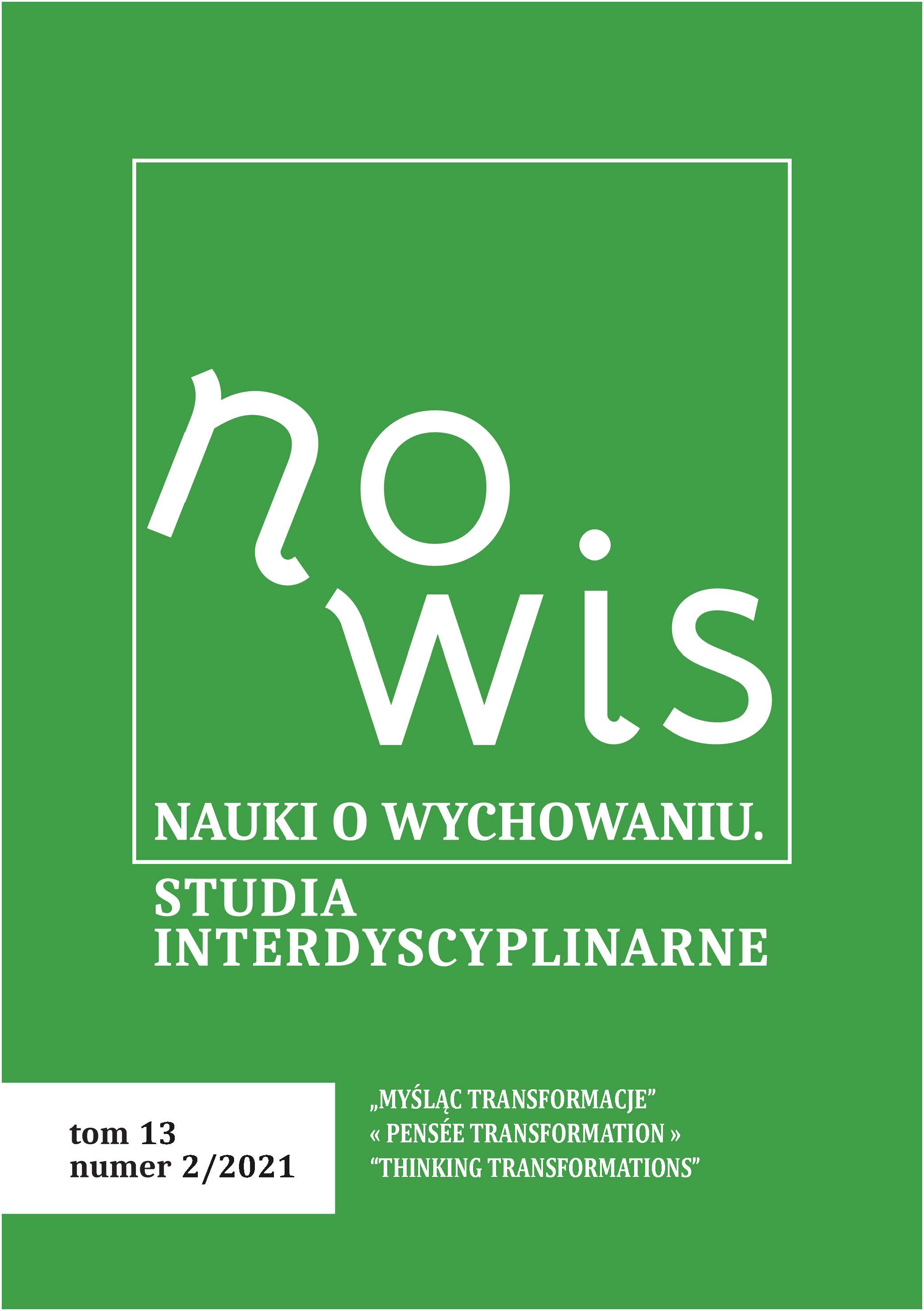(Re) conceptualisation de la différence dans le contexte de l’identité du sujet agissant
DOI :
https://doi.org/10.18778/2450-4491.13.07Mots-clés :
otherness, difference, identity, acting subject, responsive ethicsRésumé
L’article traite de l’identité du sujet agissant – qui en tant que tel (c’est-à-dire le sujet qui s’exprime) étant toujours en relation avec l’autre (et en référence à la philosophie de l’homme de Paul Ricoeur aussi avec lui-même comme autre) – est un sujet relationnel. La catégorie de « différence » s’inscrit dans le processus de construction de son identité. Elle est habituellement associée à la différenciation des autres – y compris de soi-même, par exemple, à une période antérieure. Et ainsi comprise, elle indiquerait une frontière entre le sujet et les autres (et lui-même comme un autre) et en même temps c’est elle qui « garderait » le sujet dans le « régime » de son identité. Dans l’article, la catégorie de différence, qui s’insinue dans la lecture des significations de la différance de Jacques Derrida, est déplacée de l’extérieur vers l’intérieur du sujet agissant, alias relationnel, et présentée comme une antériorité primaire de son identité en train de se construire. Il s’agit de l’importance de « l’agitation » invisible de ce sujet, qui n’est pas en soi une condition de changement ni de modifications (dans) de son identité – elle indique leur possibilité, impliquant la capacité de répondre à « l’agitation » elle-même. C’est ainsi que l’on arrive à la généalogie de l’éthique de soi en tant que sujet agissant alias relationnel, où la différance derridienne se manifeste par l’étalement, la pause, l’écart temporel et spatial – entre l’endroit où quelque chose est ici (ce que / qui je suis ici) et ce qui n’est pas encore quelque part (ce que / qui je ne suis pas là). Ce n’est que dans cette optique que l’on peut révéler une altérité avec laquelle « il faut faire quelque chose », aussi parce que c’est elle qui fait la différence dans le domaine de l’identité du sujet agissant, alias relationnel, en préfigurant une éventuelle modification. Toutefois, l’identité du sujet agissant, avec la différance de Derrida qui y est inscrite, ne constitue pas de base stable pour être un tel sujet. C’est pourquoi l’éthique réactive devient si importante, ses principales catégories sont la responsabilité en tant que réponse et engagement liés à l’interprétation de Heidegger de la raison d’action et au respect, chez Ricoeur, de la parole donnée dans la promesse. Cela signifie que le sujet agissant, alias relationnel, est « tout simplement » ancré dans l’éthique – il n’est pas pour autant destiné à agir éthiquement mais l’éthique de devenir un sujet agissant est une condition de la façon dont il agit.
Références
Bachelard G. (2000) Filozofia, która mówi nie. Esej o filozofii nowego ducha w nauce, trans. J. Budryk, Gdańsk, Słowo/obraz/terytoria.
View in Google Scholar
Barbaras R. (2017) Trzy znaczenia pojęcia „żywe ciało”, trans. J. Migasiński in: Główne problemy współczesnej fenomenologii, J. Migasiński, M. Pokropski (eds.), Warszawa, Wydawnictwa Uniwersytetu Warszawskiego: 80–96, https://doi.org/10.31338/uw.9788323524397
View in Google Scholar
DOI: https://doi.org/10.31338/uw.9788323524397.pp.80-96
Buber M. (1992) Ja i Ty. Wybór pism filozoficznych, trans. A. Doktór, Warszawa, Państwowe Wydawnictwo Naukowe.
View in Google Scholar
Burzyńska A. (2013) Dekonstrukcja, polityka i performatyka, Kraków, Universitas.
View in Google Scholar
Cichowicz S. (1975) Bez złudzeń, „Teksty: Teoria Literatury, Krytyka, Interpretacja”, no. 3 (21): 68–74.
View in Google Scholar
Choińska B. (2014) Podmiot i dyskurs w świetle myśli wybranych przedstawicieli poststrukturalizmu francuskiego, Kraków, Universitas.
View in Google Scholar
Dąbrowski K. (1979) Dezintegracja pozytywna, Warszawa, Państwowy Instytut Wydawniczy.
View in Google Scholar
Derrida J. (1978) Różnia, trans. J. Skoczylas, J. Cichowicz in: Drogi współczesnej filozofii, M. J. Siemek (ed.), Warszawa, Czytelnik: 374–411.
View in Google Scholar
Derrida J. (1996) Psyche. Odkrywanie Innego, trans. M. P. Markowski in: Postmodernizm. Antologia przekładów, R. Nycz (ed.), Kraków, Wydawnictwo Baran i Suszyński: 81–107.
View in Google Scholar
Derrida J. (1998) Jednojęzyczność innego, czyli proteza oryginalna, trans. A. Siemek, “Literatura na Świecie”, no. 11–12: 24–111.
View in Google Scholar
Derrida J. (1999) O gramatologii, trans. B. Banasiak, Warszawa, Wydawnictwo KR.
View in Google Scholar
Derrida J. (2004) Pismo i różnica, trans. K. Kłosiński, Warszawa, Aletheia.
View in Google Scholar
Derrida J. (2007) Pozycje. Rozmowy z Henri Ronsem, Julią Kristevą, Jean-Louis Houdebinem i Guy Scarpettą, trans. A. Dziadek, Katowice, Fa-art.
View in Google Scholar
Farred G. (2016) ‘Nostalgieria’: Derrida przed i po Frantzu Fanonie,“Ethics in Progress”, Vol. 1, Issue 7 Polish Supplement, Vol. 1, no. 1, Art. #19: 299–318, https://doi.org/10.14746/eip.2016.1.19
View in Google Scholar
DOI: https://doi.org/10.14746/eip.2016.1.19
Friesen N. (2014) Waldenfels’ Responsive Phenomenology of the Alien: An Introduction, “Phenomenology & Practice”: 1–11, https://doi.org/10.29173/pandpr20640
View in Google Scholar
DOI: https://doi.org/10.29173/pandpr20640
Fromm E. (1994) Niech się stanie człowiek. Z psychologii etyki, trans. R. Saciuk, Warszawa–Wrocław, Państwowe Wydawnictwo Naukowe.
View in Google Scholar
Glinkowski W. (2011) Człowiek – istota spoza kultury. Dialogika Martina Bubera jako podstawa antropologii filozoficznej, Łódź, Wydawnictwo Uniwersytetu Łódzkiego.
View in Google Scholar
DOI: https://doi.org/10.18778/7525-537-9
Heidegger M. (2001) Zasada racji, trans. J. Mizera, Kraków, Wydawnictwo Baran i Suszyński.
View in Google Scholar
Kopaliński W. (1989) Słownik wyrazów obcych i zwrotów obcojęzycznych, Warszawa, Wiedza Powszechna.
View in Google Scholar
Kruszelnicki M. (2008) Drogi francuskiej heterologii, Wrocław, Wydawnictwo Naukowe Dolnośląskiej Szkoły Wyższej.
View in Google Scholar
Lacan J. (2004) Le séminaire, Livre X, L’angoisse, Paris, Seuil.
View in Google Scholar
Lévinas E. (2000) Inaczej niż być lub ponad istotą, trans. P. Mrówczyński, Warszawa, Fundacja Aletheia.
View in Google Scholar
Marzec A. (2011) Différance Derridy. Czy błąd daje się (wy)tłumaczyć?, „Przekładaniec”, no. 24: 263–280.
View in Google Scholar
Męczkowska A. (2006) Podmiot i pedagogika: od oświeceniowej utopii ku pokrytycznej dekonsktrukcji, Wrocław, Wydawnictwo Naukowe Dolnośląskiej Szkoły Wyższej Edukacji TWP we Wrocławiu.
View in Google Scholar
Nycz R. (2017) Kultura jako czasownik. Sondowanie nowej humanistyki, Warszawa, Wydawnictwo Instytutu Badań Literackich PAN.
View in Google Scholar
Otto R. (1999) Świętość. Elementy irracjonalne w pojęciu bóstwa i ich stosunek do elementów racjonalnych, trans. B. Kupis, Warszawa, Wydawnictwo KR.
View in Google Scholar
Piłat R. (2016) Podmiotowość jako relacja osoby do jej własnej przyszłości in: Spór o podmiotowość. Perspektywa interdyscyplinarna, A. Warmbier (ed.), Kraków, Księgarnia Veldemicka: 37–60.
View in Google Scholar
Potępa M. (2004) Fenomenologia faktycznego życia. Martin Heidegger, Warszawa, Genessis.
View in Google Scholar
Reut M. (2010), Narracja i tożsamość: pytanie o “ja” jako problem etyczny i pedagogiczny, Wrocław, Wydawnictwo Naukowe Dolnośląskiej Szkoły Wyższej.
View in Google Scholar
Ricoeur P. (2005) O sobie samym jako innym, trans. B. Chełstowski, Warszawa, Wydawnictwo Naukowe PWN.
View in Google Scholar
Surma-Gawłowska M., Zawadzki A. (ed.) (2015) Myśl mocna, myśl słaba. Hermeneutyka włoska od połowy XX wieku. Antologia tekstów, Kraków, Księgarnia Veldemicka.
View in Google Scholar
Szkudlarek T. (2008) Dyskursywna konstrukcja podmiotowości („puste znaczące” a pedagogika kultury), “Forum Oświatowe”, special issue: 125–140.
View in Google Scholar
Szkudlarek T. (2012a) Ryzyko tożsamości in: W. Łukaszewski, D. Doliński, A. Fila-Jankowska, T. Maruszewski, A. Niedźwieńska, P. Oleś, T. Szkudlarek, Tożsamość: trudne pytanie kim jestem, Sopot, Smak Słowa: 127–143.
View in Google Scholar
Szkudlarek T. (2012b) Tożsamość in: M. Cackowska, L. Kopciewicz, M. Patalon, P. Stańczyk, K. Starego, T. Szkudlarek, Dyskursywna konstrukcja podmiotu: przyczynek do rekonstrukcji pedagogiki kultury, Ars Educandi – Monografie, no. 3, Gdańsk, Wydawnictwo Uniwersytetu Gdańskiego: 303–356.
View in Google Scholar
Szkudlarek T. (2017) Polityczność, tożsamość i humanistyczna produkcja znaczeń, “Chowanna”, no. 1 (48): 57–70.
View in Google Scholar
Tischner J. (2006) O człowieku. Wybór pism filozoficznych, Wrocław–Warszawa–Kraków, Zakład Narodowy im. Ossolińskich – Wydawnictwo.
View in Google Scholar
Walczak A. (2011) Spotkanie z wychowankiem. Ku tożsamości ipse pedagoga, Łódź, Wydawnictwo Uniwersytetu Łódzkiego.
View in Google Scholar
Walczak A. (2012) Tworzenie wiedzy pedagogicznej z perspektywy archetypowych wymiarów kobiecości i męskości, „Ars Educandi”, no. IX: 152–174, https://doi.org/10.26881/ae.2012.09.10
View in Google Scholar
DOI: https://doi.org/10.26881/ae.2012.09.10
Waldenfels B. (2009) Podstawowe motywy fenomenologii obcego, trans. J. Sidorek, Warszawa, Oficyna Naukowa.
View in Google Scholar
Warmbier A. (2019) Tożsamość, narracja i hermeneutyka siebie. Paula Ricoeura filozofia człowieka, Kraków, Universitas.
View in Google Scholar
Téléchargements
Publiée
Comment citer
Numéro
Rubrique
Licence

Ce travail est disponible sous licence Creative Commons Attribution - Pas d'Utilisation Commerciale - Pas de Modification 4.0 International.





 Le site web de la revue, hébergé par l'équipe éditoriale de NOWIS se trouve sur la plate-forme Index Copernicus:
Le site web de la revue, hébergé par l'équipe éditoriale de NOWIS se trouve sur la plate-forme Index Copernicus: 





